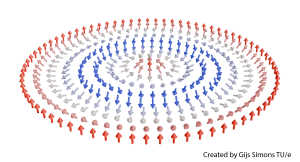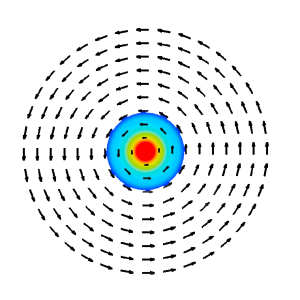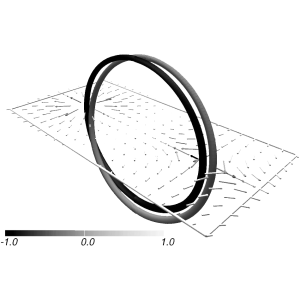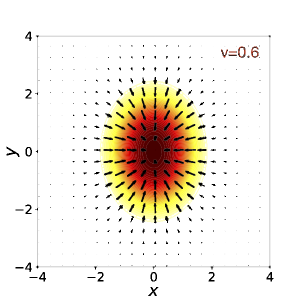COST Action POLYTOPO - CA23134: Topological Textures in Condensed Matter
Explore a series of physical systems using concepts of topology that lead to a deeper understanding of physical phenomena.
Upcoming events
WG1 Meeting on "Topological Quantum Systems in Real and Momentum-Space and Beyond"
21-23 April 2026, Birmingham, UK
...
Training School on "Topological Textures: theory and mathematical analysis, simulation and experiment"
11-14 May 2026, Zagreb, Croatia
...
Workshop on "Topological textures: experiment, theory, simulation, and mathematical analysis"
15-18 June 2026, Iasi, Romania
Our area
The mathematical concept of topology is widely applied in condensed matter and other systems (magnets, ferroelectrics, optics and structured light, fluids, ultra-cold atoms and superfluids, superconductors, liquid crystals, topological band structures) providing a fresh perspective and leading to a deeper understanding of many physical phenomena. The Action focuses on theory and experiment for the creation and annihilation of topological textures and on their statics and their dynamical properties.
Typical examples of topological textures are domain walls, vortices, skyrmions, and hopfions. Their dynamics is often counter-intuitive and it is linked to topology in surprising ways. Their properties are often suitable for applications in sensors, logic and non-Boolean devices, logic-in-memory computing, and unconventional, neuromorphic, or quantum computing.
Working groups

WG1. Topology and Transfer of Expertise
Identify and describe topological textures in a broad sense, in both real and momentum space. Investigate these textures in various physical systems and realistic models, and explore the relationships between them.

WG2. Topological Textures and Applications
Explore the general properties of topological textures and related theory, including a more precise mathematical description. Study the generation, controlled annihilation, and manipulation of these textures.

WG3. Textures in Three Dimensions
Investigate textures localized in three dimensions and their relation to quasi-2D textures. Develop theory alongside computational and experimental efforts.

WG4. Dynamics and Topology
Examine the solitary wave and particle-like characteristics of topological textures, as well as collections of textures. Study non-equilibrium processes and phase transitions.
Join a Working Group
POLYTOPO welcomes new members who like to engage within one of the networks working groups.
To become a member of a WP:
- Verify / update your e-cost profile or create one.
- Submit your application through e-cost portal.

Explore Funding Opportunities: Application, Evaluation & Eligibility
Short Term Scientific Missions
ITC & YRI Conferences
Present your own work in a high-level conference, fully organised by a third party.
Workshops & Training Schools
POLYTOPO brings together the separate sub-communities of theoretical, experimental, applied physics, and applied mathematics working on various physical systems applying concepts of topology, it combines expertise and boost synergies. It aims to support a larger community and to develop a unified framework for topological condensed matter systems.

32
Countries

4
Working groups
Job Opportunities
PhD position in theoretical and computational physics
Location: Alikhanyan National Science Laboratory (Yerevan Physics Institute), Yerevan, Armenia
Start Date: February 2026
Application Deadline: January 1, 2026
Subject Areas: Theoretical Physics, Nonlinear Dynamics, Quantum Field Theory
Description: The newly established Nonlinear Dynamics and Quantum Soliton Group, led by Dr. Danial Saadatmand, invites applications for a fully funded PhD position in theoretical and computational physics. The position is funded through the national Incoming Research Fellowship Program 2025/2 (Integration Grant) of the Republic of Armenia and is expected to begin in February 2026.
The successful candidate will carry out research at the Alikhanyan National Science Laboratory (Yerevan Physics Institute). The project focuses on nonlinear field theories, soliton and sphaleron dynamics, resonance phenomena, and quantum aspects of topological configurations. The research will involve a combination of analytical techniques and high-precision numerical simulations.
The PhD student will have opportunities to collaborate with international partners in Canada, South Africa, Armenia, and China, and to participate in international conferences and research visits.
Qualifications: Applicants should have:
- A Master’s degree (or near completion) in Physics, Applied Mathematics, or a closely related field
- A solid background in classical and/or quantum field theory, partial differential equations, or nonlinear dynamics
- Experience with scientific programming and numerical simulations (considered an asset)
Application:
- Applicants should submit a single PDF file containing:
- Curriculum vitae
- Cover letter
- Names and contact information of two referees (or two reference letters)
Applications should be sent by January 1, 2026 to:

